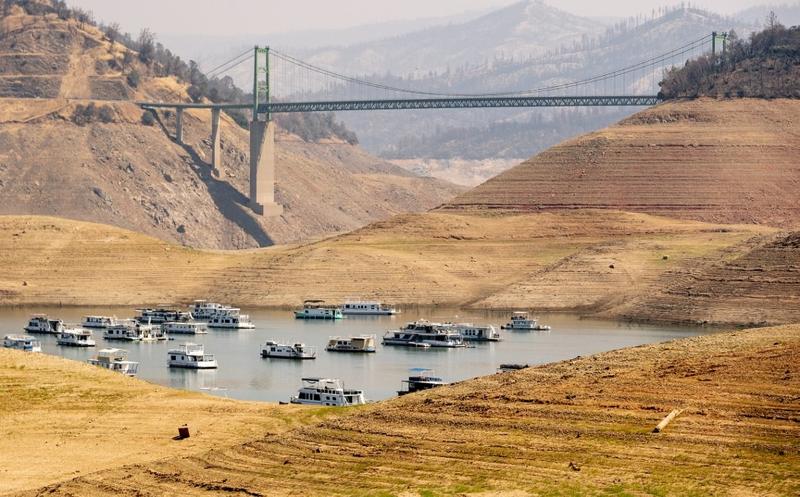 In this Sept 5, 2021 file photo, houseboats sit in a narrow section of water in a depleted Lake Oroville in Oroville, California. Extreme shifts in weather are becoming more frequent in California and are a harbinger of what is to come for the rest of a warming planet, scientists say. (JOSH EDELSON / AFP)
In this Sept 5, 2021 file photo, houseboats sit in a narrow section of water in a depleted Lake Oroville in Oroville, California. Extreme shifts in weather are becoming more frequent in California and are a harbinger of what is to come for the rest of a warming planet, scientists say. (JOSH EDELSON / AFP)
NAIROBI – Financing for climate change adaptation that has so far fallen short of earlier pledges should be scaled up in order to avert disasters linked to rising atmospheric temperatures, the UN Environment Programme said in a report launched Thursday.
The sixth edition of UNEP Adaptation Gap Report, launched on the sidelines of the ongoing 26th session of the Conference of the Parties (COP26) to the United Nations Framework Convention on Climate Change in Glasgow, Scotland, warns that failure to scale up adaptation financing could escalate the climate crisis.
ALSO READ: Deliver on promises, developing world tells rich at climate talks
"As the world looks to step up efforts to cut greenhouse gas emissions – efforts that are still not anywhere strong enough – it must also dramatically up its game to adapt to climate change," said Inger Andersen, the UNEP executive director.
There is an urgent need to scale up and further increase public adaptation finance both for direct investment and for overcoming barriers to private sector adaptation.
UN Environment Programme
According to the adaptation gap report 2021, the scale of climate-related disasters has outpaced humanity's capacity to adapt to them amid lackluster funding and implementation.
The report notes the cost of adaptation could range between 140 billion to $300 billion annually by 2030 and for developing countries bearing the brunt of the climate crisis, adaptation costs could range from $280 billion to $500 billion annually by 2050.
In addition, climate finance flowing to developing countries to cater for mitigation and adaptation reached $79.6 billion in 2019 but suffered pandemic disruptions in 2020.
The report discloses that adaptation costs in developing countries are five to ten times greater than current public finances earmarked to support that endeavor, thereby worsening the vulnerability of communities to climatic shocks.
"There is an urgent need to scale up and further increase public adaptation finance both for direct investment and for overcoming barriers to private sector adaptation," says the report.
Among the priority sectors that require sufficient adaptation financing includes agriculture, health, tourism, infrastructure, energy, water and forestry, says the report.
 In this Oct 6, 2021 photo, boats remain moored in the coastal village of Gabura in southern Bangladesh district of Satkhira, which is frequently struck by natural disasters. The effects of global warming – particularly increased cyclones, coastal and tidal flooding that bring saltwater further inland – are destroying the livelihoods of millions in the south region, according to development agencies operating there. (MAHMUD HOSSAIN OPU / AP)
In this Oct 6, 2021 photo, boats remain moored in the coastal village of Gabura in southern Bangladesh district of Satkhira, which is frequently struck by natural disasters. The effects of global warming – particularly increased cyclones, coastal and tidal flooding that bring saltwater further inland – are destroying the livelihoods of millions in the south region, according to development agencies operating there. (MAHMUD HOSSAIN OPU / AP)
According to the report, gradual progress has been achieved in adaptation financing in the last four years amid the emergence of new instruments, approaches and actors, such as the issuance of green bonds and blended financing.
READ MORE: China urges developed nations to boost efforts on climate change
Moreover, implementation of adaptation programs domiciled within multilateral funds including the Adaptation Fund, the Green Climate Fund and the Global Environment Facility has risen gradually but steadily.
There has been a tendency to fund larger projects worth more than $10 million and the top 10 donors funded more than 2,600 projects between 2010 and 2019 with a primary focus on adaptation. And 20 percent of the adaptation projects were in the agriculture sector, 20 percent in the environment sector while 10 percent were directed toward enhancing the resilience of water and infrastructure.


